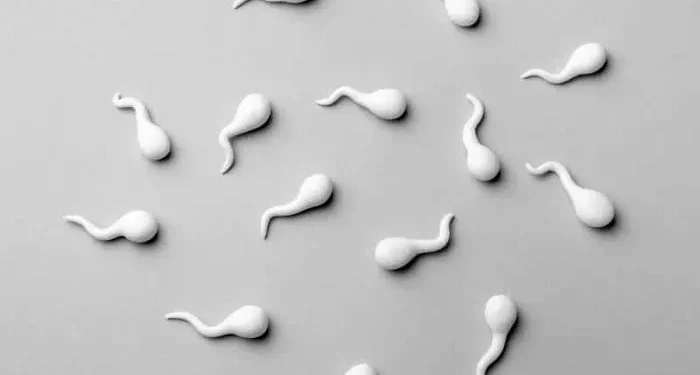Azoospermia is a medical condition characterized by the complete absence of sperm in the ejaculate. It is a significant cause of male infertility, affecting approximately 1% of the male population and 10-15% of infertile men. Understanding the causes of azoospermia is crucial for diagnosis and treatment. This article aims to provide a comprehensive overview of the various factors contributing to this condition.
Types of Azoospermia
Azoospermia can be classified into two main types: obstructive and non-obstructive.
Obstructive Azoospermia
In obstructive azoospermia, sperm production is normal, but there is a blockage in the reproductive tract that prevents sperm from being present in the ejaculate.
Non-Obstructive Azoospermia
Non-obstructive azoospermia is characterized by a problem in sperm production. This can be due to hormonal imbalances, genetic conditions, or damage to the testicles.
Causes of Obstructive Azoospermia
Congenital Blockages
Some men are born with blockages in the reproductive tract. These congenital blockages can occur in various locations, such as the vas deferens, epididymis, or ejaculatory ducts.
Congenital Absence of the Vas Deferens
The vas deferens is a tube that carries sperm from the testicles to the urethra. In some men, the vas deferens is absent from birth. This condition is often associated with cystic fibrosis or mutations in the CFTR gene.
Congenital Obstruction of the Epididymis
The epididymis is a tube where sperm mature and are stored. Congenital obstructions can occur in the epididymis, preventing sperm from passing through.
Acquired Blockages
Blockages can also develop later in life due to infections, surgeries, or injuries.
Infections
Sexually transmitted infections (STIs) such as chlamydia and gonorrhea can cause inflammation and scarring in the reproductive tract, leading to blockages.
Surgeries
Surgeries involving the pelvic region, such as hernia repairs or vasectomies, can inadvertently damage or block the vas deferens or other parts of the reproductive tract.
Injuries
Injuries to the reproductive organs, such as trauma to the testicles, can lead to blockages or scarring that obstruct sperm flow.
Cysts
Cysts can develop in the reproductive tract and block the passage of sperm. Ejaculatory duct cysts, for example, can obstruct the flow of sperm into the urethra.
Causes of Non-Obstructive Azoospermia
Genetic Factors
Genetic abnormalities can affect sperm production and lead to non-obstructive azoospermia.
Klinefelter Syndrome
Klinefelter syndrome is a genetic condition where a male has an extra X chromosome (XXY instead of XY). This condition affects testicular development and function, leading to reduced or absent sperm production.
Y Chromosome Microdeletions
Microdeletions on the Y chromosome can impact genes responsible for sperm production. Specific regions, known as AZF (Azoospermia Factor) regions, are critical for spermatogenesis. Deletions in these regions can result in azoospermia.
Kallmann Syndrome
Kallmann syndrome is a genetic disorder that affects the development of the hypothalamus, a part of the brain that controls hormone production. This can lead to low levels of gonadotropins, hormones necessary for sperm production.
Hormonal Imbalances
Hormones play a crucial role in sperm production. Imbalances in these hormones can result in non-obstructive azoospermia.
Hypogonadotropic Hypogonadism
Hypogonadotropic hypogonadism occurs when the pituitary gland or hypothalamus fails to produce sufficient gonadotropins. This can be due to genetic conditions, tumors, or brain injuries.
Hyperprolactinemia
Hyperprolactinemia is a condition characterized by elevated levels of prolactin, a hormone produced by the pituitary gland. High prolactin levels can interfere with the production of gonadotropins, reducing sperm production.
Testicular Disorders
Disorders affecting the testicles can lead to non-obstructive azoospermia.
Varicocele
A varicocele is an enlargement of the veins within the scrotum. This condition can impair sperm production by increasing the temperature around the testicles and reducing blood flow.
Undescended Testicles
Also known as cryptorchidism, undescended testicles occur when one or both testicles fail to descend into the scrotum during fetal development. This condition can damage the testicles and affect sperm production.
Testicular Cancer
Testicular cancer and its treatments, such as chemotherapy and radiation, can damage the testicles and impair sperm production.
See Also: Azoospermia: Causes, Diagnosis, and Treatment
Systemic Diseases and Conditions
Certain systemic diseases and conditions can impact overall health and affect sperm production.
Diabetes
Diabetes can lead to hormonal imbalances and nerve damage, both of which can impair sperm production.
Obesity
Obesity can disrupt hormone levels and lead to conditions such as hypogonadotropic hypogonadism, affecting sperm production.
Chronic Infections
Chronic infections, such as HIV or tuberculosis, can impact overall health and interfere with sperm production.
Environmental and Lifestyle Factors
Exposure to Toxins
Exposure to environmental toxins and chemicals can damage the testicles and affect sperm production.
Pesticides and Chemicals
Pesticides, heavy metals, and industrial chemicals can have toxic effects on the testicles, leading to reduced sperm production.
Radiation
Exposure to radiation, whether from medical treatments or environmental sources, can damage the testicles and impair sperm production.
Heat Exposure
Prolonged exposure to high temperatures can negatively affect sperm production.
Occupational Hazards
Jobs that involve prolonged exposure to heat, such as working in high-temperature environments, can impair sperm production.
Hot Baths and Saunas
Frequent use of hot baths and saunas can raise the temperature of the testicles and reduce sperm production.
Lifestyle Choices
Certain lifestyle choices can impact sperm production and lead to azoospermia.
Smoking
Smoking tobacco can damage sperm DNA and reduce sperm production. The harmful chemicals in cigarettes can affect the testicles and impair sperm production.
Alcohol Consumption
Excessive alcohol consumption can lead to hormonal imbalances and liver damage, both of which can affect sperm production.
Drug Use
The use of recreational drugs, such as marijuana, cocaine, and anabolic steroids, can impair sperm production.
Stress
Chronic stress can affect hormone levels and reduce sperm production. High levels of stress can lead to hormonal imbalances that interfere with sperm production.
Diagnosis of Azoospermia
Diagnosing azoospermia involves a series of tests and evaluations to determine the underlying cause.
Medical History and Physical Examination
A thorough medical history and physical examination are the first steps in diagnosing azoospermia. The doctor will ask about the patient’s medical history, surgeries, infections, and lifestyle choices. A physical examination will assess the size and consistency of the testicles and check for the presence of a varicocele.
Semen Analysis
Semen analysis is a crucial test in diagnosing azoospermia. The test involves examining a semen sample under a microscope to check for the presence of sperm. If no sperm are found, further tests are conducted to determine the cause.
Hormonal Testing
Hormonal testing involves measuring the levels of hormones that regulate sperm production. These hormones include:
- Follicle-stimulating hormone (FSH)
- Luteinizing hormone (LH)
- Testosterone
- Prolactin
Abnormal levels of these hormones can indicate issues with the hypothalamus, pituitary gland, or testicles.
Genetic Testing
Genetic testing can identify chromosomal abnormalities and genetic mutations that may cause azoospermia. Tests may include karyotyping to detect chromosomal abnormalities and Y chromosome microdeletion analysis.
Imaging Studies
Imaging studies, such as scrotal ultrasound, can help identify blockages, varicoceles, or other structural abnormalities in the reproductive tract.
Testicular Biopsy
A testicular biopsy involves removing a small sample of testicular tissue for examination. This test can determine if sperm production is occurring within the testicles. If sperm production is normal, the cause is likely obstructive azoospermia. If sperm production is impaired, the cause is likely non-obstructive azoospermia.
Treatment of Azoospermia
The treatment of azoospermia depends on the underlying cause. Treatment options vary and may include medical, surgical, or assisted reproductive techniques.
Medical Treatments
Medical treatments are often used to address hormonal imbalances or infections.
Hormone Therapy
Hormone therapy can help correct hormonal imbalances that affect sperm production. For example, men with hypogonadotropic hypogonadism may be treated with gonadotropins to stimulate sperm production.
Antibiotics
Antibiotics are used to treat infections that may be causing blockages or inflammation in the reproductive tract.
Surgical Treatments
Surgical treatments are used to correct structural issues or remove blockages.
Varicocelectomy
A varicocelectomy is a surgical procedure to repair a varicocele. This can improve blood flow to the testicles and enhance sperm production.
Vasovasostomy and Vasoepididymostomy
These surgical procedures are used to treat blockages in the vas deferens or epididymis. Vasovasostomy involves reconnecting the severed ends of the vas deferens, while vasoepididymostomy involves connecting the vas deferens directly to the epididymis.
Transurethral Resection of the Ejaculatory Ducts (TURED)
TURED is a surgical procedure to remove blockages in the ejaculatory ducts. This can restore the flow of sperm into the ejaculate.
Assisted Reproductive Techniques
Assisted reproductive techniques can help men with azoospermia achieve biological parenthood.
Testicular Sperm Extraction (TESE)
TESE involves retrieving sperm directly from the testicles through a small incision. This technique is used when sperm are produced but not present in the ejaculate.
Microdissection TESE (Micro-TESE)
Micro-TESE is a more advanced form of TESE, where a microscope is used to identify areas of the testicle with active sperm production. This technique increases the chances of retrieving viable sperm.
Intracytoplasmic Sperm Injection (ICSI)
ICSI is an assisted reproductive technique where a single sperm is injected directly into an egg. This technique can be used with sperm retrieved through TESE or Micro-TESE.
Conclusion
Azoospermia is a complex condition with multiple causes, ranging from genetic factors and hormonal imbalances to blockages and lifestyle choices. Accurate diagnosis and targeted treatment are crucial for managing this condition and helping affected men achieve biological parenthood. Understanding the underlying causes of azoospermia is the first step toward effective treatment and improved fertility outcomes.
Related Links:



























